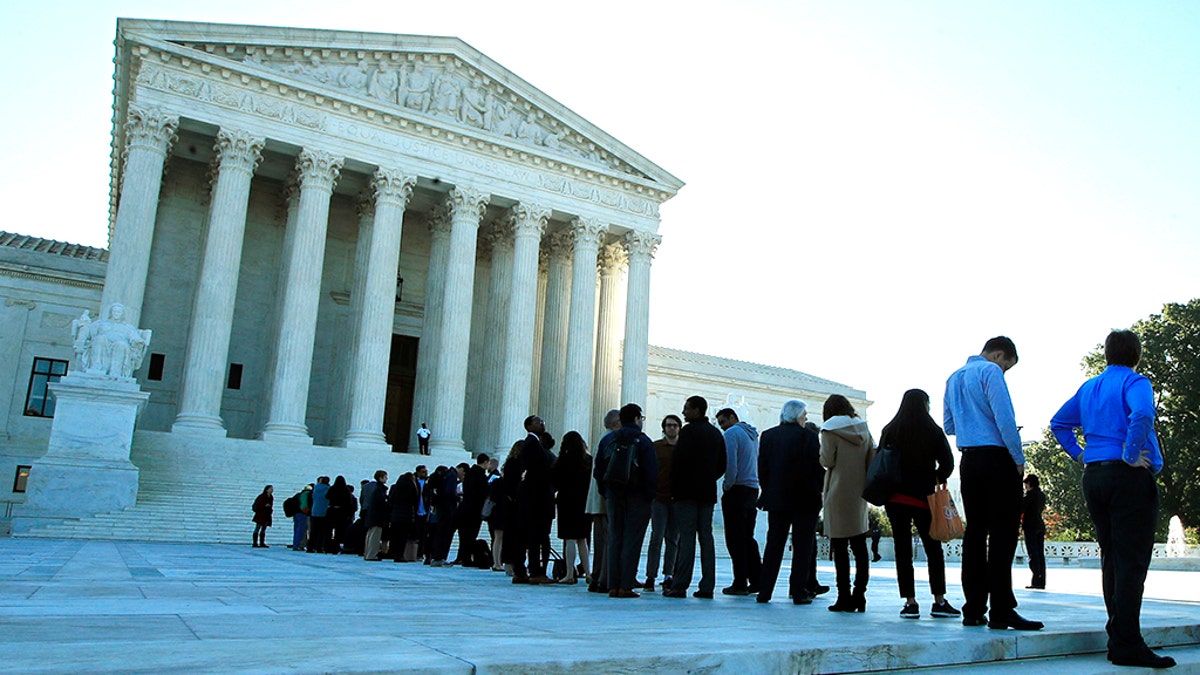
FILE -- (AP)
The Supreme Court ruled wisely Wednesday that requiring public employees to pay money to a union in order to be allowed to work violates the First Amendment rights of the employees. The 5-4 ruling means all public employees, regardless of where they live, will finally have a choice about whether to help fund or associate with a government union.
Thanks to right-to-work laws, people in 28 states have until now enjoyed more freedom than the rest of us. But the Supreme Court evened the score for public employees with Monday’s ruling in Janus v. AFSCME (the American Federation of State, County and Municipal Employees).
In my home state of Alaska, teachers and other public employees are forced to pay fees to unions they didn’t choose to represent them, in order to hold the jobs they love.
Before moving to Alaska, I was a teacher in Idaho, a right-to-work state, where membership in a union is a choice. I chose not to belong.
I work hard and want to do this important job, and now I finally won’t have to pay an organization just for the privilege of teaching.
When I arrived in Alaska in 1989, I was shocked to be told that in order to work as a teacher, union membership was mandatory. In addition, the monthly dues would be taken directly from my paycheck and deposited into the union coffers.
I have now been a public school teacher in Alaska for 29 years and am thankful to have such a rewarding profession. I work hard and want to do this important job, and now I finally won’t have to pay an organization just for the privilege of teaching.
In addition to the unfairness of having to pay a union just to keep one’s job, my union often used my dues to promote policies I don’t support. The concepts of seniority, tenure and “last in, first out” don’t allow for the possibility that some first-year teachers may get better results than ones who have been working longer.
Union-negotiated pay scales also favor tenure and seniority over a teacher’s performance. I have worked with many beginning teachers who are excellent from the start, and, in contrast, have seen experienced teachers who are not getting the job done.
Highly effective teachers are compensated on the same level as ineffective or even harmful teachers. In the union’s eyes, we are all are equal in quality. But ask any parent or teacher and they will tell you this isn’t true.
The political activities of public employee unions obviously don’t correlate with each and every employee’s personal beliefs, but we are not given the opportunity to vote on such activities.
Through my years of teaching, I have paid thousands of dollars for the National Education Association to lobby for ideas directly opposite my beliefs.
Many of the organizations supported by the NEA have nothing to do with education and many are highly controversial. Should I be forced to fund political activities and finance causes without a choice?
About five years ago, I found out that I was allowed to stop paying the political portion of union dues, so I’ve stopped. It was a difficult task uncovering this purposely secret option. I requested information from my union president, only to be ignored.
Union leadership is unhappy to lose this money. With research and persistence, I was able to complete the process on my own. However, even though I continued to pay fees to the union for the bargaining and negotiations portions of dues, exercising my right not to fund its political agenda means I could no longer vote on contracts.
When colleagues found out that I was able to opt-out of this political fund, many joined me. They had not known this opt-out was possible. Surprise! Not every teacher supports left-leaning causes. Being able to say “no” to union membership completely with the Janus ruling means teachers will be free to choose whether to fund political activities as well as policies supported by the union.
There are many unions, especially private sector ones, that serve their members well. My union, however, didn’t work for me and had no incentive to do so until now, because I and other teachers had to fund it no matter what. Now that I and others have a choice, government unions will be held accountable.
With choice, unions will need to better serve their members by working harder to earn the money they collect. We will all benefit.
For too long, workers have been forced to belong to unions and pay dues as a condition of employment. With the Supreme Court’s Janus v. AFSCME decision, teachers and other public employees will finally have the freedom they deserve.




















